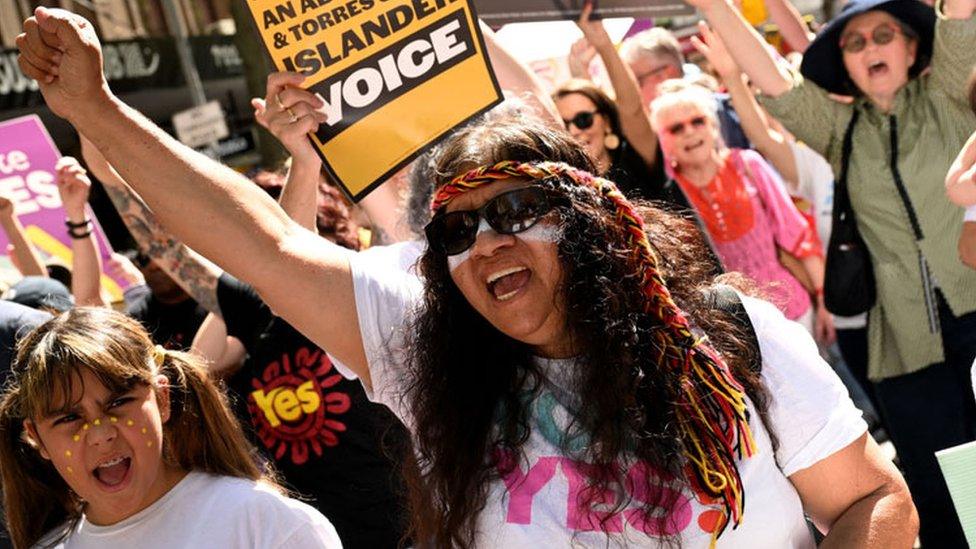Voice referendum: Australia votes in nation-defining poll
- Published
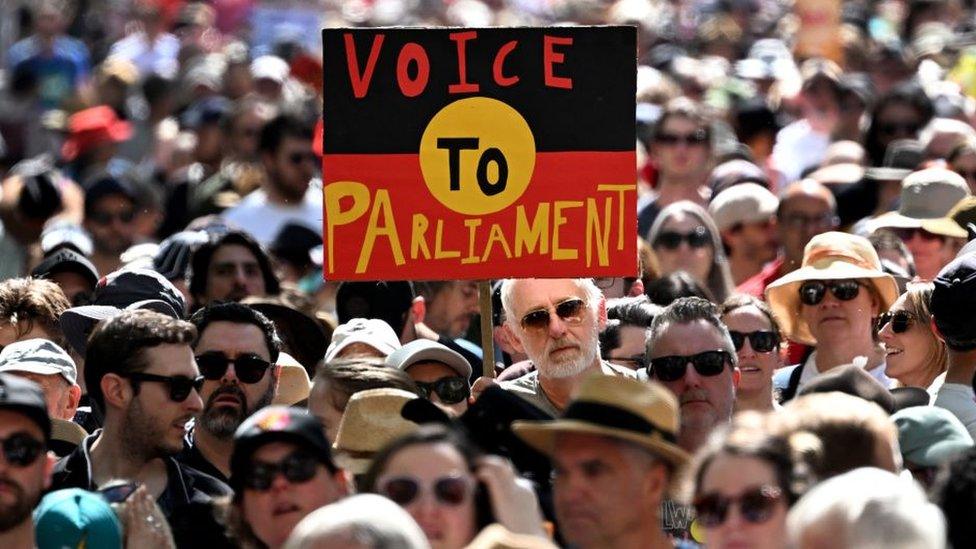
Yes or No. That is the choice Australia faces as polls have opened in what is seen as a nation-defining referendum.
A Yes vote will recognise Indigenous peoples in the country's constitution and establish a body - called the Voice - for them to advise governments on the issues affecting their communities.
A No outcome will reject both reforms.
The historic vote has exposed uncomfortable fault lines, and raised questions over Australia's ability to reckon with its past.
Some of the most painful chapters include massacres against Aboriginal and Torres Strait Islander people and the forced removal of their children.
At the heart of this referendum is a decades-long debate that has gripped Australia over how to close the gap on the glaring disparities Indigenous communities experience in areas such as health, wealth and education.
The Voice is designed to be the first step in a three-part reform process - which would involve treaty negotiations and a period of national "truth-telling"- aimed at sparking change.
It was born out of the Uluru Statement from the Heart, a 2017 document drafted by over 250 First Nations leaders.
But since Aboriginal and Torres Strait Islander people make up less than 4% of Australia's population, it will be non-Indigenous voters who decide the outcome of the referendum.
Warring visions
The campaign itself, has become ensnared in a bitter culture war - with competing visions emerging about what the Voice stands for.
Yes advocates see this vote as a opportunity to empower Indigenous communities, who have been calling for greater political representation for generations.
But the official No campaign has labelled the Voice as a "dangerous" and "divisive" proposal.
Early in the debate, Australia's opposition leader Peter Dutton suggested the Voice would have an "Orwellian effect" on Australian society by giving First Nations people greater rights.
He, and others, have also argued that the body will undermine existing government structures and could clog up the courts with its objections.
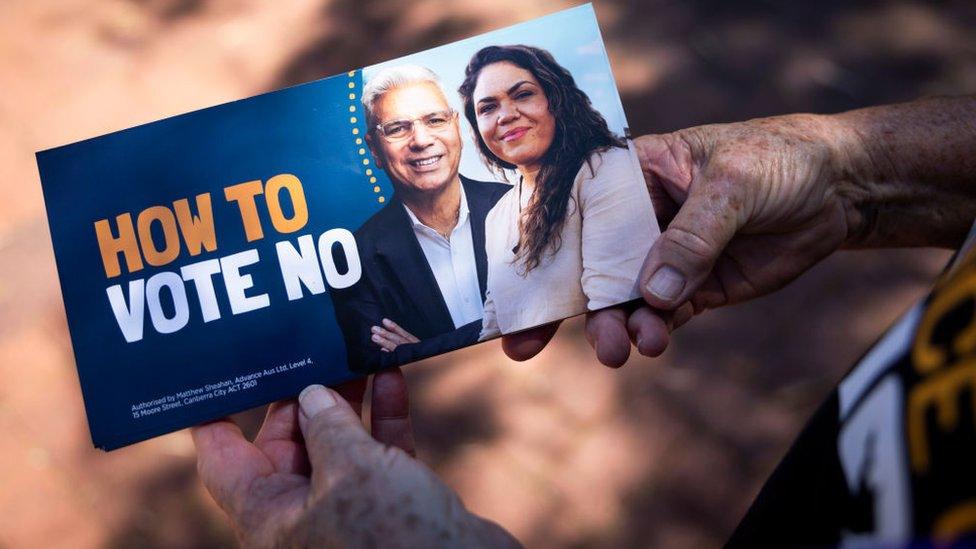
The No side says the Voice is "divisive"
Both points are strongly disputed. In legal advice, the solicitor general said the proposal would "enhance" Australia's system of representative government, not threaten it. And leading constitutional experts say the Voice does not confer special rights on anyone.
Grassroots groups - such as the Indigenous-led Blak sovereign movement - have spoken out against the Voice for other reasons though. Their argument is that it would be "another powerless advisory body" and that treaty negotiations should be prioritised instead.
In the final weeks of the campaign, academics, sporting stars and celebrities also weighed into the debate, throwing their support behind the reform.
"We believe that the Australian nation stands on a precipice, looking towards a clear horizon, a new dawn, when this continent's First Nations will for the first time have a voice," an open letter signed by over 350 historians said.
But the No vote has continued to gain traction in almost every demographic, and the path to victory for Yes has grown narrower, according to the polls.
Campaigners on the Yes side say mis-and-disinformation has contributed to the decline in support. The Australian Associated Press' FactCheck team - which has been tasked with monitoring content on Facebook, Instagram and TikTok - told the BBC in August, that the volumes of mis-and-disinformation linked to the Voice debate had already surpassed what they saw at Australia's 2022 election.
But economic pain as Australia battles a cost-of-living crisis could also be adding to voter apathy.
A recent poll found that establishing a Voice was fifth on the list of issues those surveyed wanted the government to focus on - wages, the cost of living and housing affordability all ranked higher.
The bar for winning a referendum is also exceedingly high in Australia. Historically, only eight out of 44 attempts to change the nation's constitution have been successful. All had bipartisan support, which the Voice doesn't.
Australia's 'Brexit moment'?
Win or lose, questions will continue to be asked about the tone of the debate that's played out in recent months.
This is Australia's first referendum in the social media age, and it's been riddled with conspiracies, which have been debunked - including claims that the Voice will create an "apartheid system" or that it's part of a United Nations plot to take over the country.
Amid all the noise, reports of racial abuse have also skyrocketed, according to mental health agencies. For many Indigenous advocates, the months spent trying to temper the debate have taken a toll.
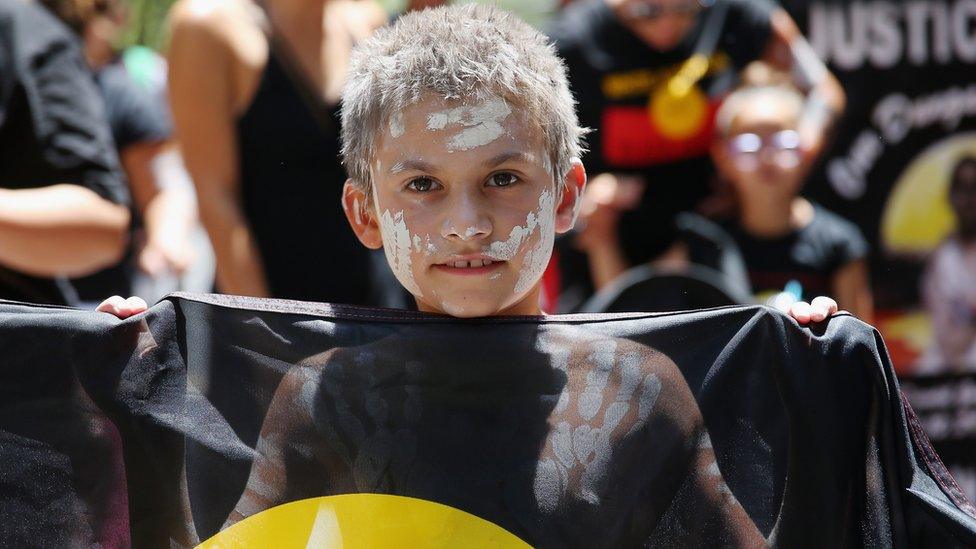
A young boy holds up an Aboriginal Flag in Sydney
"I don't think there's many non-Indigenous people who are going through a similar experience to what we are as First Nations peoples right now," Dr Clinton Schultz, a Gamilaroi man and First Nations mental health advocate says.
"There's such a level of exhaustion in communities. We're just trying to get through the day."
The levels of disinformation and division have led to comparisons with the 2016 US presidential election, as well as headlines asking whether this could be Australia's "Brexit moment".
Prime Minister Anthony Albanese, who called for the referendum, has been appealing to voters to consider the country's image on the world stage when casting their ballots.
But for many First Nations people this vote isn't about how the world views Australia. They say it's about being seen and heard.
A No vote, says Larissa Baldwin-Roberts, who leads the activist group GetUp, could have an "incredible silencing effect" on Indigenous communities.
"It's one thing for governments to say no, but when millions of voters say no, that says something else."
If it is a Yes outcome though, the Widjabul Wia-bul woman says, it should be viewed as a "starting gun" for "the real work to begin".
Leading No campaigner Warren Mundine meanwhile, has urged the nation to build on the momentum of the debate, regardless of the result.
"All sides of this referendum debate must come together on Sunday to harness this goodwill, enthusiasm and momentum for change," the Bundjalung man wrote in an editorial.
Related topics
- Published6 September 2023
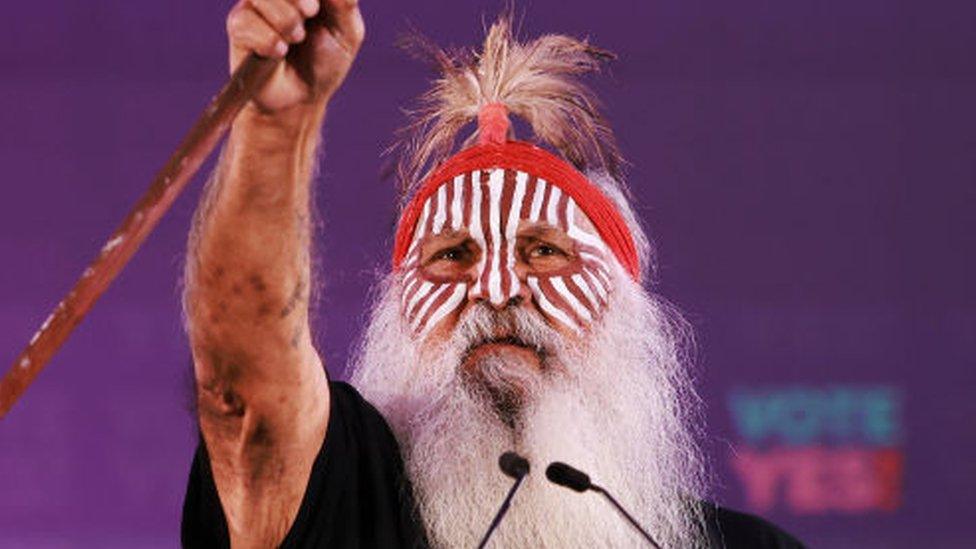
- Published14 October 2023
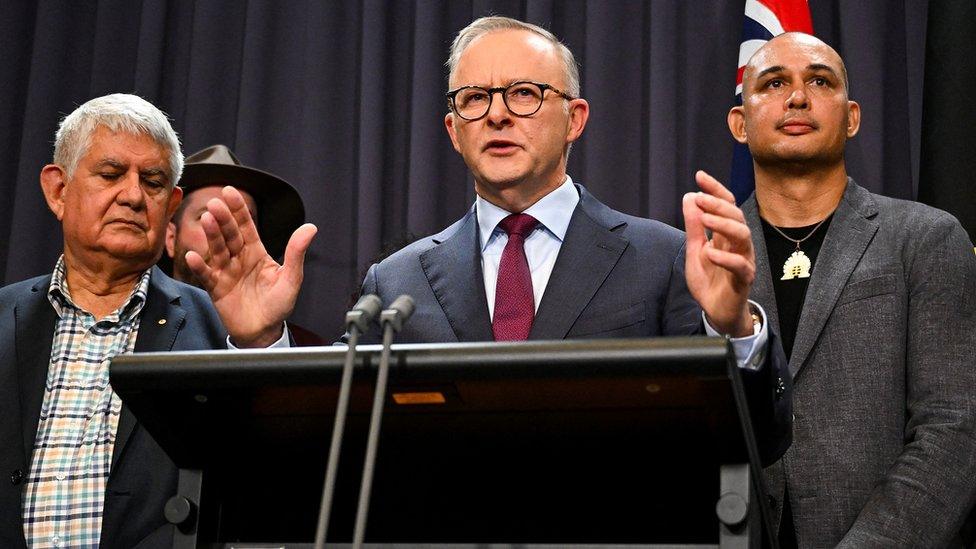
- Published4 October 2023
